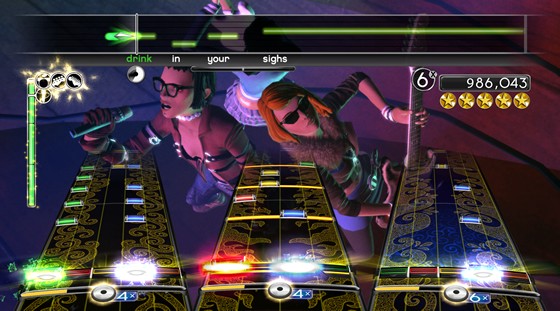By Paulo Camacho

Screenshot of gameplay to the popular video game series, Rock Band. Can playing this game actually help music students in their education?
It’s no surprise that people can learn music in a plethora of ways — one of which, being technology. We, at Picardy, pride ourselves on using the best of education technology to bring music education to a student’s fingertips. But whether it’s through us, or any of the many other different methods in this technology-based world, people can learn music and its principles in a wide variety of ways.
That being said, let me ask you — have you seen these kinds of videos on the YouTubes?
If you don’t recognize it, that’s the mega-popular video game series, Rock Band, with four players playing one of its most challenging songs, Dream Theater’s “Panic Attack.” While the video doesn’t show the actual players, here’s a version that shows someone performing on the “guitar,” while this other video shows someone playing their part on the “drums.” Needless to say, it’s a challenging task.
The Rock Band series of video games started in 2007, on the heels of popular musical performance-based games like Guitar Hero and Karaoke Revolution. Its mainstream popularity — combining unique musical gaming mechanics with popular rock songs — helped spawn three sequels, the latest of which was released in 2015.
Here are the basics to Rock Band: you can play as one of four parts to the “band” — vocals, guitar, bass or drums. The object is to “play” a popular song with your chosen part as accurately as possible, based on the note-matching gameplay of your part.
For example, if you are playing an instrument, there are colored notes on a musical scroll that represent buttons on your instrument — either frets on the guitars, or pads on the drum kit. Hitting the corresponding buttons to the beat of the song will incrementally increase your score. The same goes for vocals, based on the accuracy of your tone, relative to the scrolling frequency wave on the screen.
The levels of difficulty vary, with some being as difficult — if not more so — as the video featured above. Mastering the quick, complicated sequences of a given song in Rock Band can certainly be as taxing as learning any instrument in real-life.
But, is it the same?
Many who have come across these musical performance video games have asked the same thing: can playing Rock Band make you a better guitar player, drummer, or singer?
Depending on the part — and depending on who you ask — the camps are split. On the one hand, many musicians — especially guitarists and drummers — have argued that Rock Band is simply a simulation of playing instruments, and nothing more. There is no musicality or technique that can be learned from playing these games — it’s simply hitting the right buttons on the “instrument” at the right times. If you have ever tried to learn an instrument in your life, you probably know that technique is paramount when it comes to making an instrument sound good.
Furthermore, it could possibly give gamers who have mastered Rock Band the wrong impression about learning how to play a real instrument. Learning the chord progressions, hand orientations and playing techniques of a real guitar is much different than the robotic strumming of a virtual guitar controller.
On the other hand, there are a number of advantages to learning music through games like Rock Band. For example, at its core, the basic skill of sight-reading is inherent in both traditional music education and the challenge of playing the video game. After all, the cognitive skills needed to follow the color-coded patterns of a guitar, bass, or drum track within the game are basically similar to those needed to sight-read a new musical piece.
Furthermore, in order to be a successful Rock Band player, one must sharpen their rhythmic abilities. Again, going back to the above video, the players must excel at rhythmic understanding in order to hit all of their “notes” accurately. The same goes for a music student’s active listening skills: in order to excel at a song in the video game, especially a song one has not heard before, it is important for the player to listen for audio cues to give them an idea of what to play next — much like with sight-reading or sight-singing in real life.
Another educational advantage to games like Rock Band involves the music, itself — they expose the player to music they otherwise would not have listened to. I can personally attest to this, as I have grown to love a lot of different tracks on Rock Band 2 that I never would have been exposed to, through my own music listening habits.
So, while relying on music performance video games won’t make it easier for someone to be the next Jimi Hendrix, they can supplement traditional methods of music education by incorporating real-world music skills with the technology of music entertainment. If nothing else, video games like Rock Band are fun to play.
So, if you get the chance, pick up that microphone, grab a virtual guitar, and get to jamming.